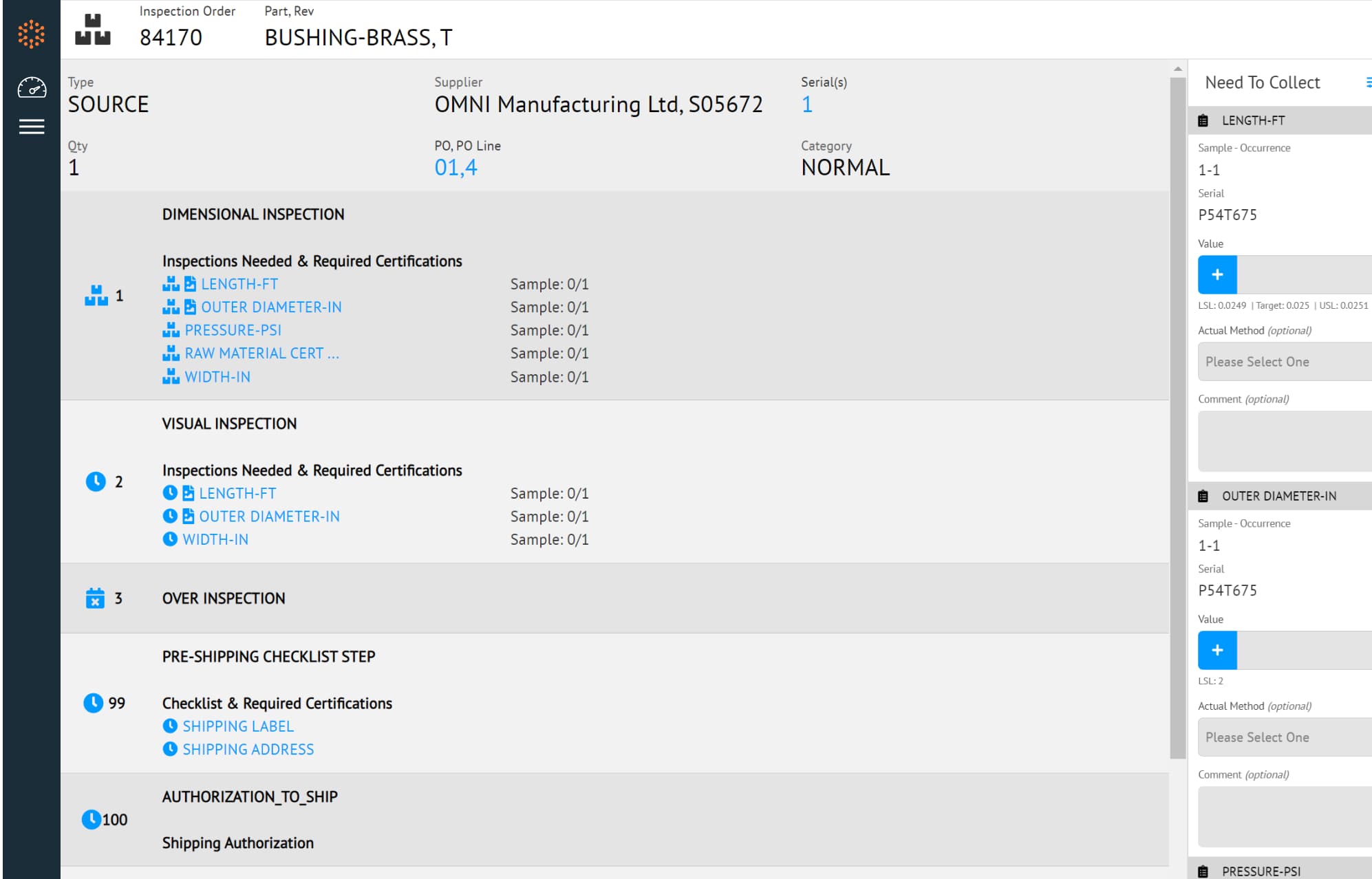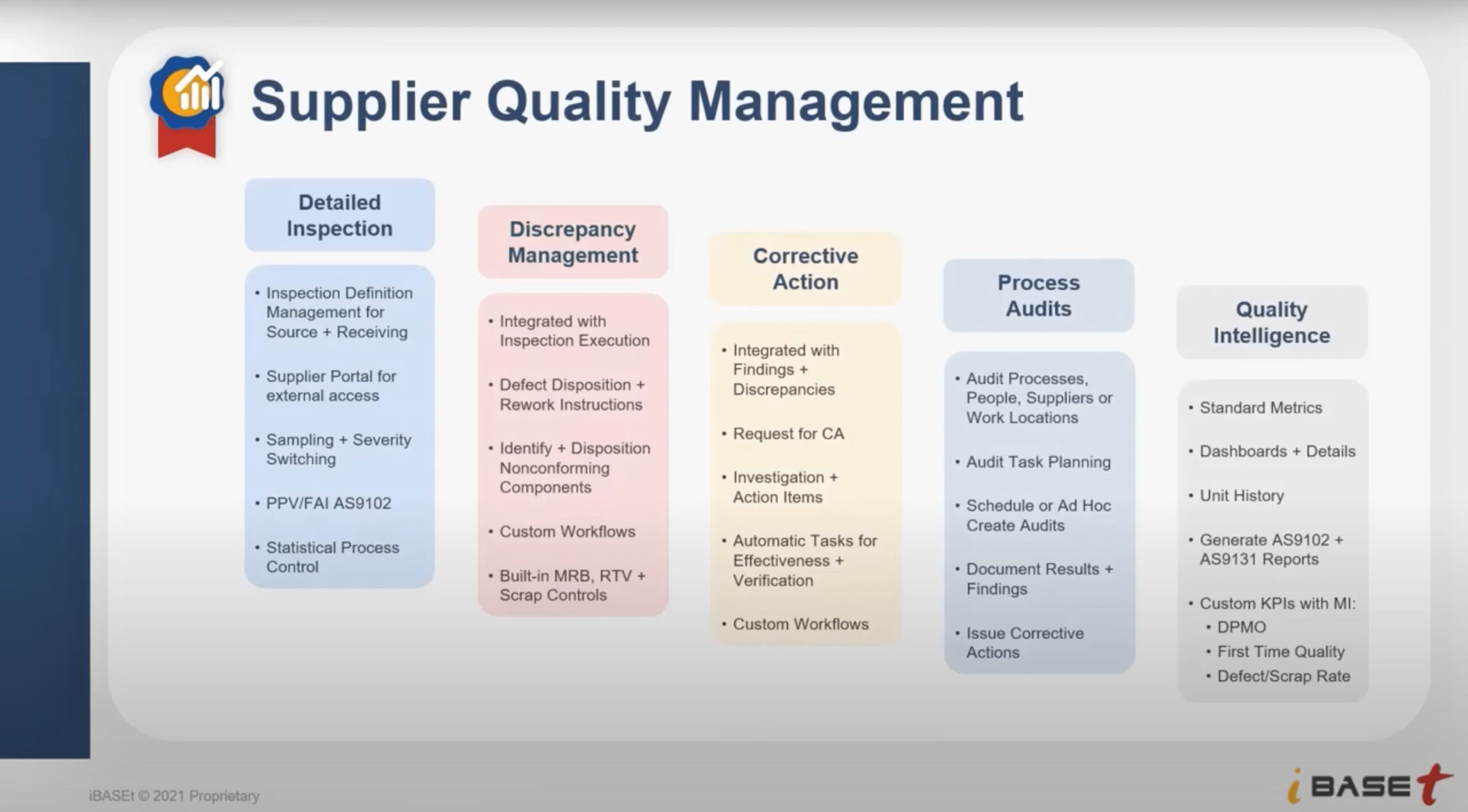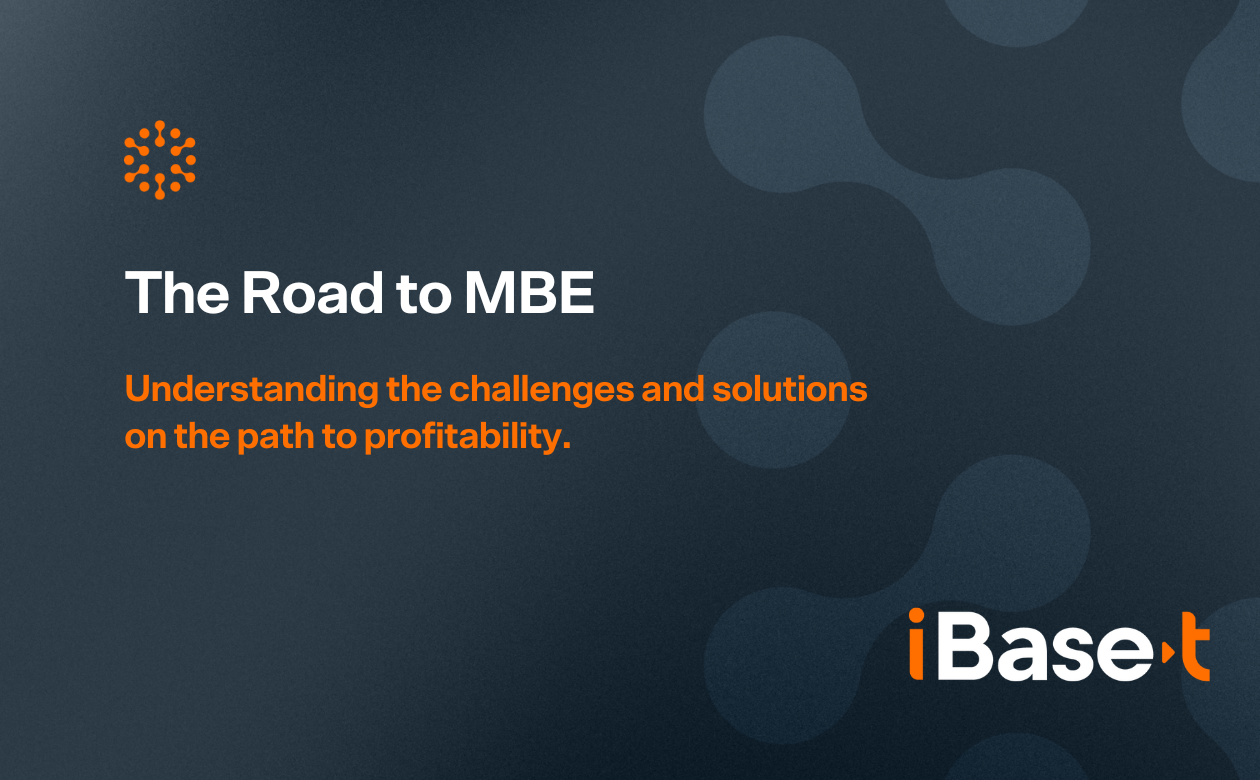A Robust, Comprehensive Approach to Supplier Quality Management on an Enterprise Scale
Supply chains for complex manufacturers are extensive and difficult to manage. To optimize performance, manufacturers must carefully track how each supplier is contributing to their enterprise. Are suppliers causing problems or enabling success? Solumina Supplier Quality Management software can determine the answer by monitoring and responding to changes in supplier performance on an enterprise scale.
Gains Driven by Solumina SQM

- Improved communication with suppliers
- Continuous improvement in supplier performance
- Ability to measure and compare supplier performance
- Continuous improvement in design and production
- Healthy competition among suppliers through accountability
Solumina SQM by iBase-t
Get visibility and control of supplier products before they reach your shop floor.
What Is Supplier Quality Management?
Supplier quality management is the measure of a supplier’s ability to deliver their goods or services. It is used to audit supply chain quality and identify the root cause of any issues.
For complex discrete manufacturers, suppliers are so involved in production that they are essentially part of the manufacturing enterprise. SQM software provides the level of visibility and communication needed for suppliers to contribute their specific knowledge in the design process, creating a proactive, collaborative approach to the most consistent delivery of high-quality finished goods.
Supplier management is an ongoing process that requires continuous optimization to maintain top performance. The benefits are fully realized once companies have built a relationship of shared expertise and resources. Beyond just components, suppliers can also provide specialized design and development services.

SQM Is More Than Just Quality Inspections
SQM software provides centralized communication with suppliers. It creates a framework for collaborative supplier quality and eliminates the problems caused by email and paper-based communication. A well-designed SQM solution delivers more than on-spec parts. It can reduce the frequency of inspections, which saves time and money while yielding higher productivity. As suppliers show sustained performance and reliability, SQM relaxes the inspection requirements.
What Are the Key Features of Solumina SQM?
Solumina SQM by iBase-t is a best-in-class supplier inspection planning and execution system.
Solumina SQM provides a robust, comprehensive approach to Supplier Quality Management on an enterprise scale. It enables visibility and control of your purchased products before they even hit your shop floor – so you can decrease cycle times while increasing productivity, traceability, and quality.
Additional key features of Solumina SQM include:
Inspections
Compliance
Non-Conforming Material Report (NCMR)
Corrective and Preventive Actions (CAPA)
Advanced Product Quality Planning (APQP)
Production Part Approval Process (PPAP)
Measurement System Analysis (MSA)
Statistical Process Control (SPC)
Extending Quality Throughout Your Value Chain
Because of its far-reaching impacts, SQM should be a key component of any Quality, Six Sigma, or Industry 4.0 initiative and should be a central consideration as enterprises look to digitally transform their operations. Solumina SQM extends quality control throughout the value chain, improving not only quality, but all aspects of operations from production efficiency to system integration, customer satisfaction, and overall profitability.
“SQM provides a complete paperless system for defining, managing, communicating and verifying product specifications and requirements with suppliers.”

Solumina SQM Brochure
Solumina Supplier Quality Management (SQM) by iBase-t is an integrated, dynamic system that helps you efficiently define, communicate, manage, and verify product requirements with your suppliers.
Benefits of Solumina SQM
By closing the loop on supplier quality management, manufacturers can expect to see many positive results in areas such as:
- Reduced manual management tasks
- Improved component parts quality
- Minimized inventory in receiving inspection
- Lower sourcing and warranty administrative costs
- Supplier ownership of process strengths and weaknesses
- Minimized need for third-party contract inspection
- Reduced inspection and audit oversight cost
- Quicker issue disposition and corrective action

Leverage Closed-loop Quality Management
Closed-loop quality management means providing a centralized process for corrective and preventive action (CAPA) for non-conformances, which avoids communication issues that can arise from siloed departments. Without centralized communication between departments, time can end up being wasted on unnecessary quality inspection processes.

Require Closed-loop Supplier Management
Closed-loop supplier quality management ensures that suppliers have robust quality assurance processes in place and that the performance is visible. In turn, this drives higher supplier quality performance than can be achieved by testing alone. Fewer issues will arise during manufacturing, and you can scale down the number of inspections needed to maintain a high rate of quality.

How to Choose a Supplier in Complex Manufacturing
Supply chains are the lifeblood of any complex, highly engineered production process.
The more agile and flexible the supply chain, the greater the resilience and strength of the manufacturer. Solumina SQM offers a competitive advantage for manufacturers tasked with producing highly engineered products where they must assure the quality of their entire supply chain.
The quality standards in today’s increasingly networked and global marketplace demand strict compliance and lowered costs. Manufacturers must have complete faith in their suppliers. No two suppliers are the same, and every manufacturer has unique needs for their product and circumstances. The following are some general steps to a successful supplier relationship:
Lay Out Your Supplier Strategy
Compare The Suppliers
Look For Strong Partners
Make Backup Plans
Understand Supplier Quality Certifications
How To Measure Supplier Quality In Complex Discrete Manufacturing
One of the main benefits of Solumina SQM is the ability to measure the quality of your suppliers accurately and quickly.
Most manufacturers use their own unique KPIs, but there are some overarching aspects of supplier quality that are always important to measure. The traditional approach to supplier quality is to inspect incoming items to ensure they meet purchase specifications. The traditional approach to supplier quality is to inspect incoming items to ensure they meet purchase specifications.
Solumina SQM takes a proactive role in ensuring that supplier materials and services meet the manufacturer’s quality expectations. It incorporates all the processes associated with supplier delivery, including manufacturing processes, on-time delivery, and proper packaging.
Here are some of the ways Solumina SQM measures quality in complex discrete manufacturing:
Align Business Goals With Your Suppliers
Enact A Real-Time Data Collection System
Design A Performance Assessment System Specific To Your Business
Strengthen The Communication And Information Flow
Additional Resources on SQM for Complex Manufacturing
Learn What Solumina
Can Do for You With a Custom Demo



